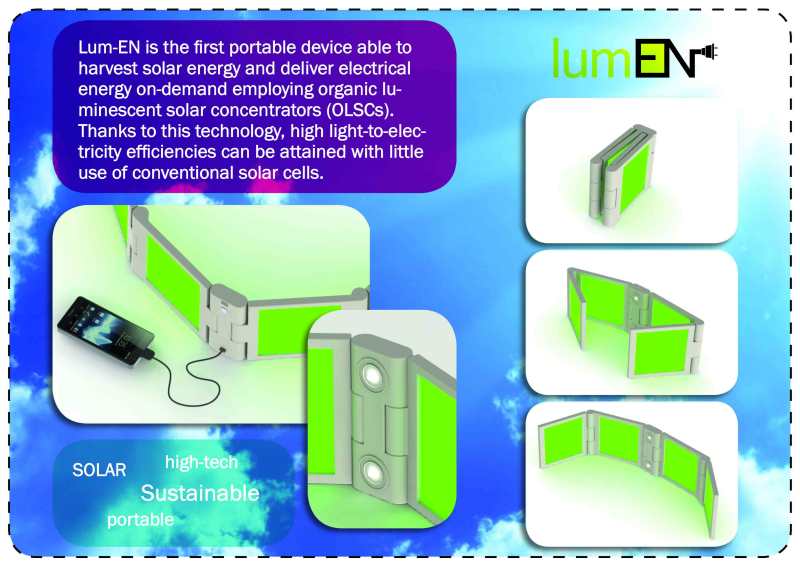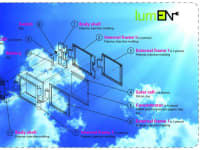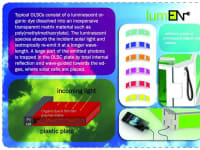
Lum-EN is the first portable device able to harvest solar energy and deliver electrical energy on-demand employing organic luminescent solar concentrators (OLSCs). Thanks to this technology, high light-to-electricity efficiencies can be attained with little use of conventional solar cells.
Typical OLSCs consist of a luminescent organic dye dissolved into an inexpensive transparent matrix material such as poly(methylmethacrylate). The luminescent species absorb the incident solar light and isotropically re-emit it at a longer wavelength. A large part of the emitted photons is trapped in the OLSC plate by total internal reflection and wave-guided towards the edges, where solar cells are placed. Ideally, the emission spectrum of the luminescent species matches with the absorption spectrum of the solar cell so that its power conversion efficiency can be improved and a reduction of the actual active surface area of the solar cell can be attained, thereby ensuring reduction of costs of solar energy production.
As opposed to simple solar cells which can only work under direct sunlight, the OLSC panels can operate well also under diffuse light, making it possible for Lum-EN to be used also in poorly illuminated environments, cloudy locations or even indoor. To the best of our knowledge, no sustainable technologies able to work efficiently under diffuse light are present on the market. In particular, no portable products integrating the OLSC technology have appeared on the market yet.
By varying the active surface of the luminescent solar concentrators, the output energy can be modulated so as to power a set of LEDs or recharge a smart-phone, a tablet or any electrical portable device such as mp3 players.
Lum-EN can be used in all situations where a stand-alone energetic source is needed, such as during outdoor activities, excursions, camping, sailing. The device is easily transportable (light-weight and pocket-size) and straightforward to use thanks to its highly ergonomic design and its user-friendly interface.
In the field of consumer products based on sustainable technologies, Lum-EN addresses specific market pains, such as the lack of an appealing product-design, the lack of identifying esthetics and the inefficient functioning under poor illumination. In particular, most sustainable energy devices are powered by rigid and bulky silicon solar cells, which are not integrated in the product but appear to be applied only after the full product design process is completed. On the contrary, a real integration between design and technology is one of the main characteristics of Lum-EN, as the technology and the design of the product are intimately connected. These features make Lum-EN an attractive product for young people (aged 15 to 35) and all individuals aware of environmental and sustainability issues and interested in cool and appealing design.
The materials needed for the main components of Lum-EN are inexpensive (dye-doped PMMA plates) and easily purchasable on the market. The manufacturing techniques employed for the production of Lum-EN are well know techniques typically employed for plastic-based consumer products (e.g. injection molding) and can therefore be easily optimized in terms of number of pieces/cost ratio.
-
Awards
-
 2012 Consumer Products Category Winner
2012 Consumer Products Category Winner
Like this entry?
-
About the Entrant
- Name:Gianmarco Griffini
- Type of entry:teamTeam members:Gianmarco Griffini - Department of Chemistry, Materials and Chemical Engineering "Giulio Natta", Politecnico di Milano (Italy);
Massimo Micocci -
Department of Chemistry, Materials and Chemical Engineering "Giulio Natta", Politecnico di Milano (Italy);
Francesca Ostuzzi - Department of Chemistry, Materials and Chemical Engineering "Giulio Natta", Politecnico di Milano (Italy) - Patent status:none








